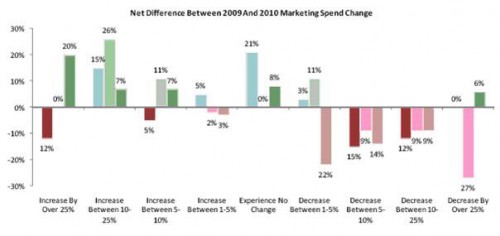Competing For Share Of Global Chemicals Industry Spend In 2010-2011. Marketing & Sales Behaviors & Strategies – Impact Of Global Economic Uncertainty
25 Oct 2010 • by Natalie Aster

London - This may be due to the fact that the expected ROI on brand building and awareness takes a longer time to generate than customer retention and acquisition, which usually result in higher sales or revenue within a short span of time. However, investment in brand building and awareness helps to drive the sales volume over the long run.
Marketing aims seem to differ according to company turnover, with small companies (turnover up to US$100m) expecting to spend more on ‘customer retention’, ‘customer acquisition’ and ‘brand building / awareness’ in order to increase their market presence, The medium-sized companies (turnover US$100m-US$1bn) would rather direct their marketing spend on ‘brand building / awareness’, ‘lead generation’ and ‘customer acquisition’ so as to hold on to their grounds, increase their market share and fight off competition effectively. Large companies (turnover US$1bn or more) plan to spend more on ‘brand building / awareness’, ‘cross-selling / up-selling’ and ‘customer retention’ strategies.

Marketing spend is expected to be high for North America in comparison to the other regions. On the other hand, the rest of the world region is expected to reduce marketing spend on ‘crossselling / up-selling’ of products, ‘lead generation’ and ‘brand building / awareness’ as compared to other geographies.
The most important marketing strategies for respondents from Europe are ‘customer acquisition’, ‘cross-selling / up-selling’ of products and ‘brand building / awareness’, while the respondents in Asia Pacific favour ‘customer retention’, ‘lead generation’ and ‘brand building / awareness’.
More information can be found in the report “Competing For Share Of Global Chemicals Industry Spend In 2010-2011: Supplier Marketing & Sales Strategies & Industry Outlook” by iCD Research.
Report Details:
Published: April, 2010
Pages: 120
Price: USD 2,000
Report Sample Abstract:
Threats and Opportunities For The Chemicals Industry
As discussed earlier, ‘cost containment’ is expected to be one of the important business concerns for companies in 2010-2011. Companies are implementing counter measures to decrease its effect on their business. ‘Budget control’, ‘downsizing manpower’, ‘decreasing overhead costs’, ‘decreasing raw material costs’ and ‘reducing energy consumption’ are the most important actions being implemented by companies for cost containment.
For most of the companies, the initial step for containing cost is ‘budget control’. Most companies have tightened the existing budgets and have levied strict control on external spending. “Tight cost management both on cost center / profit center as well as project level. Monthly reporting process for projects is in place, including a rolling forecast”, notes a departmental head of a chemicals industry supplier company operating in Western Europe.
The focus has also shifted to reduce costs within various functions of the company. ‘Decreasing overhead costs’, ‘decreasing raw material costs’, ‘reducing travel expense’ and ‘restructuring / reviewing cost plans’ are some of the important direct cost reduction measures being adopted by companies. “Get the all usable at a very competitive price. Control all wastage, sell all products as early as possible, get all the utilities at low cost, control or reduce all overheads”, says a professional executive of a chemical manufacturer / processor company operating in Central Asia.
Companies are aiming to decrease overhead costs by reducing administration expenses, entertainment expenses, support staff expenses; they try to reduce the cost of product and the effect of costs on the profit margin of the company. “Our business unit cost side is under pressure only on account of financial charges. We are not in a position do much to reduce that burden, hence trying everything to increase sales to reduce the average overhead cost per unit of quantity”, claims a business unit head of a chemical industry supplier company in the Middle East. Most of the cost or expense plans are being reviewed to check their effect on actual profit margin and these plans are being remodeled to reduce fundamental costs.
To order the report or ask for sample pages contact [email protected]
Contacts
MarketPublishers, Ltd.
Mrs. Alla Martin
Tel: +44 208 144 6009
Fax: +44 207 900 3970
[email protected]
www.marketpublishers.com
Analytics & News
